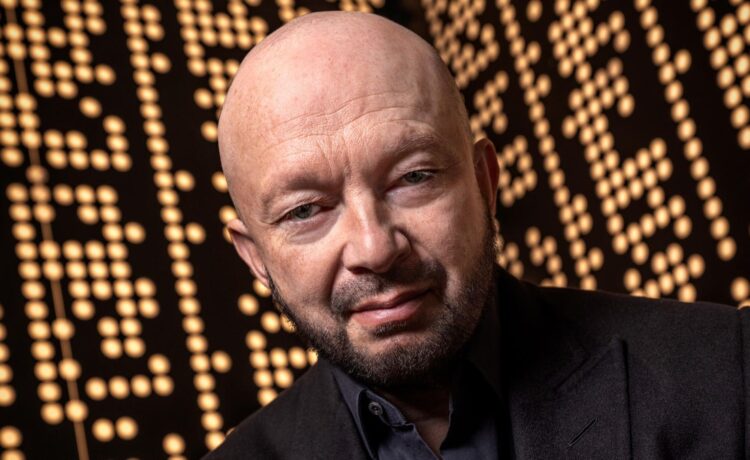Igor Tulchinsky made a fortune by outwitting human traders. Now he’s banking on large language models to make his hedge fund even smarter.
It’s a cloudy March morning in Midtown Manhattan and Igor Tulchinsky is explaining from behind his wooden desk, between sips of coffee and long pauses to think, his latest algorithmic vision—the introduction of large language models for his hedge fund WorldQuant. “The first thing that the LLM can do is it can structure data and 80% of data that’s out there is unstructured,” says Tulchinsky, dressed in all black, his piercing blue eyes gleaming with excitement. “It’s like a free lunch.”
Tulchinsky has spun his decades-long fixation with data into a Wall Street goldmine. The 58-year-old, who immigrated to the U.S. as a child from Belarus, has made a fortune in the obscure, highly technical world of quantitative investing. WorldQuant, which he owns, now manages $10 billion for billionaire Izzy Englander’s much larger hedge fund Millennium Capital Management, which it spun out of in 2007. A separate entity, WorldQuant Millennium Advisors, which Tulchinsky and Englander cofounded, manages another $13 billion for outside investors. Between his equity stakes in the two firms and cash he’s made for himself from trading, Tulchinsky is worth an estimated $1.7 billion.
Igor Tulchinsky by Alexander Karnyukhin for Forbes
Quants like Tulchinsky write computer code that automatically execute stock trades based on price signals. WorldQuant’s specialty has long been in statistical arbitrage—algorithms, or what he calls “alphas,” that exploit price inefficiencies between individual securities or entire equity portfolios. Those alphas execute all sorts of trades, including buying and selling stocks (long positions), betting against stocks (short selling), and a slew of more byzantine hedge fund strategies that remain confidential. Whether it’s Trump’s see-sawing tariffs policy or a tech company’s quarterly earnings report, there’s likely a WorldQuant alpha calculating how to make money from it. “We trade the ripples, not the waves,” says Tulchinsky, whose funds likely execute hundreds of thousands of trades on a typical day. “We have a stockpile of millions and millions of alphas.”
Now Tulchinsky wants to turbocharge his alpha factory by pairing it with large-language models (think OpenAI’s ChatGPT), which he believes can help build new and better algorithms. “We can be using AI and LLMs to convert and discover alphas in different domains,” he says. “Possibilities are endless. The LLMS are getting stronger and stronger.”
While funds like WorldQuant have been employing AI tools for years – in research, in predictive modeling and in writing code – the use of LLMs to devise trading strategies is fairly novel. In a 46-page report on hedge funds’ use of AI prepared last June by the U.S. Senate Committee on Homeland Security and Governmental Affairs (for which WorldQuant and other major players like Citadel and Renaissance Technologies participated), LLMs were mentioned only once. “These sort of internal, proprietary LLM systems, that’s sort of an underlooked factor in how investment firms, especially quant firms, can use AI,” says Francesco Fabozzi, research director at Yale’s International Center for Finance.
WorldQuant is well positioned to capitalize on LLMs. Sources close to the company tell Forbes it employs over 150 PhDs in math, computer science and related STEM fields. Beyond Tulchinsky’s comments, the firm declined to provide specifics, though Fabozzi says it’s likely a hedge fund like WorldQuant would tap an open-source LLM model, such as Facebook’s Llama, and feed it with its existing algorithms, thus training it to discover and even write new algorithms on its own. “You can take standard LLMs and you can combine it with extra information. We have a lot of internal information, “ says Tulchinsky. “We can create this tool, which can answer very sophisticated questions for us.”
Beyond alpha discovery, Tulchinsky wants to harness LLMs to boost his firm’s research efforts. “You can ask questions of the LLM. You can give it a model like the Ray Dalio world model, and then something happens: Japan drops interest rates, and you can say, ‘Okay, using the Ray Dalio model, make predictions for how it will trickle through the world,’ and it’ll do that,” he says as a hypothetical example. (He doesn’t want to share an actual example for competitive reasons). “That becomes our own data that really nobody can replicate.”
Sources familiar with the firm say that WorldQuant’s deployment of LLMs is still in its early stages, but is actively being developed and rolled out.
For someone like Tulchinksy, AI is not just a way to make money, but a means of thinking about the world, says Stanley McChrystal, the retired four-star U.S. Army General, who has been working with Tulchinsky as a consultant since 2015 and counts him as a friend: “The ability to use data to predict things is sort of what makes him tick.” Says a grinning Tulchinsky, “With the proliferation of data and AI, we’re getting to the point where you can kind of quant everything.”
Tulchinsky’s data obsession likely took root in his unpredictable upbringing. Born in Minsk, Belarus in 1966, he grew up under the Communist regime of Pyotr Masherov, a Belarusian revolutionary turned Soviet politician. His parents, professional musicians, decided to leave their home country in 1977 when their only child was 11. “Those days when you decided to leave you immediately lost your job, they branded you as traitors publicly,” he recalls.
The Tulchinskys spent three months in Italy before they received asylum status in the United States. In America, they moved around, living in four different states by the time Tulchinsky was 17. “It’s a very transformational experience, when you give up all the things you’ve taken for granted,” he recalls of his childhood. “You become less afraid of change, and kind of even get used to it.”
Fascinated with computers from a young age, Tulchsinky was programming video games at 17. He received his B.S. and his M.A. in computer science from the University of Texas, followed by his M.B.A. in finance and entrepreneurship from the Wharton School. He began his career at AT&T Bell Laboratories (the wireless carrier’s now-defunct research and development arm), before nabbing his first finance gig at Timber Hill, the options trading firm founded by fellow Soviet refugee Thomas Peterffy.
“Of course I remember Igor,” recalls 80-year-old Peterffy, who came to the U.S. from Hungary and later transformed Timber Hill into the stock brokerage giant Interactive Brokers, the source of his $60 billion fortune. “He is a deep thinker. He reminded me of myself in my younger years as he sometimes seemed to have gotten completely lost in his thoughts and looked like he was unaware of his surroundings.”
In 1995, Tulchinsky left to team up with another future billionaire: Israel Englander, a young hedge fund trader who had founded Millennium Management six years earlier with $35 million in investor assets. As Millennium grew, Tulchinsky developed a reputation within the firm for engineering successful statistical arbitrage trades. By the early 2000s, Tulchinsky and Englander were discussing the former founding his own shop within the Millennium mothership. “As one of the pioneers of quantitative investing, Igor helped define what is possible. He has always been a step ahead,” said Englander, who seldom speaks with the press, in a written statement shared with Forbes. “It has been extraordinary to see what he has achieved.”
Yet, WorldQuant got off to the worst possible start. In August 2007, seven months after launching, there was a widespread meltdown across quant-driven investment funds after one trader’s liquidation triggered a cascade of other liquidations in what became an early tremor in the emerging financial earthquake. WorldQuant suffered but Tulchinsky says he took all of the firm’s money out of the market before it bottomed out, evading the worst. “Cutting losses is a key principle that we follow, that’s the essence of risk management” he says. “In life people don’t cut losses enough because it’s emotional, it’s unpleasant, but it’s a very good strategy.”
As assets rebounded and eventually grew, so did the embrace of global talent. WorldQuant opened its first international office in China shortly after launching when Tulchinsky tapped a Chinese friend of his to interview 1,000 candidates, and ultimately hired five of them. “They were just spectacular alpha makers,” he recalls. The firm now has 1,000 employees working in outposts across 27 cities in 16 countries including other major financial centers, like London and Tokyo, but also in less typical locales, such as Armenia, Hungary and Vietnam. “We are providing opportunity to the talent, and the talent is providing us with alphas,” explains Tulchinsky, who spends a significant amount of his time traveling to WorldQuant’s various outposts. “I’m so used to traveling, I get jet-lagged when I don’t travel.”
Outside of work, Tulchinsky also keeps busy. Between 2013 and 2023, he dropped $65 million into his charitable foundation, which primarily supports the firm’s hallmark philanthropic initiative, WorldQuant University, an accredited and tuition-free online university that he founded in 2014, which offers free masters of science degrees in financial engineering and other STEM coursework. He has also invested in over 100 startups including robot maker Figure AI and financial startup EquityZen through his venture firm WorldQuant Ventures. In his spare time, he has published three books about investing and is working on a fourth about cutting losses.
Tulchinsky has plenty more to say but Forbes’ time with him is up. The billionaire has calls to take and then an afternoon flight to Miami to visit WorldQuant employees there. He clearly doesn’t like sitting still: outside his office his firm’s credo “Change Is Progress” flashes from a 3-dimensional wall structure. “The interesting thing about Belarus,” notes Tulchinsky with astonishment, “I looked at it through Google Earth the other day—nothing’s changed in 50 years.” And with that, he gets up and leaves.




